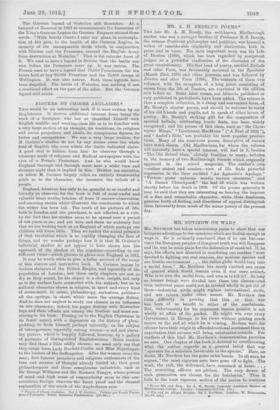MR. A. H. BEESLY'S POEMS.*
Tun late Mr. A. H. Beedy, the well-known Marlborough master, who was a younger brother of Professor E. S. Beesly, the veteran Positivist philosopher and publicist, was himself a. writer of considerable originality and distinction, both in prose and in verse. His most important work was his Life of Danton (1899), which has been regarded by competent judges as a powerful vindication of the character of the great revolutionary. His first book of poetry, entitled Ballads and other Verse, was favourably reviewed in the Spectator (March 23rd, 1895) and other journals, and was followed by Banton and other Verse (1896), The contents of these two volumes, with the exception of a long poem consisting of scenes from the life of Denton, are reprinted in the edition. now before us. Some later verses, not hitherto published or only published in periodicals, have been added. The volume is thus a complete collection, in a cheap and convenient form, of Mr. Beesly's shorter poems, and should be welcome to many of his old friends and pupils, not to speak of other lovers of poetry. Mr. Beesly's striking gift for the composition of spirited ballads, celebrating heroic feats, has been widely recognized; and his poems of this class, such as "Sir Chris. topher Rings," "Lieutenant MacMunn " ("A Feat of 1892"), and " Andre's Ride," are probably his most popular produc- tions. Many of the numerous poems descriptive of nature have much charm. Old Marlburians, for whom the volume will naturally have a special interest, will find in it, besides "The Old School Gate," already faniiliar to many, tributes to the memory of two Marlborough friends which originally appeared in the school magazine. The author's own —rather stoical and sombre—view of life finds powerful expression in the lines entitled "An Agnostic's Apology," "Fortem peace animum mortis terrors carentem," and "A Sussex Churchyard," the last of which was written shortly before his death in 1909. Of the poems generally it may be said that they are intereating as bearing the impress a a fine and remarkable character, while their freshness, genuine truth of feeling, and directness of appeal distinguish them favourably from much of the minor poetry of the present day.






















































 Previous page
Previous page